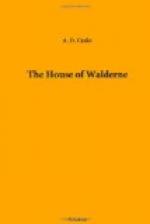They bore him to the castle. A few light wounds, which had bled profusely from the leg and arm, were all that was amiss. Hubert’s ambition was attained, for he had slain four Welshmen with his own young hand. And those to whom “such things were a care” saw four lifeless, ghastly corpses circling for days round and round an eddy in the current below the castle, round and round till one got giddy and sick in watching them, but still they gyrated, and no one troubled to fish them out. They were a sign to friend and foe, a monument of our Hubert’s skill in slaying “wildcats.”
A few days later the Lord of Hereford arrived at the castle, and visited Hubert’s sick chamber, where he brought much comfort and joy. A fine physician was that earl; Hubert was up next day.
And what was the tonic which had given such a fillip to his system, and hurried on his recovery? The earl purposed to confer upon him the degree he pined for, as soon as he could bear his armour.
At first any knight could make a knight. Now, to check the too great profusion of such flowers of chivalry, the power to confer the accolade was commonly restricted to the greater nobles, and later still, as now, to royalty alone.
It was the eve of Saint Michael’s Day, “the prince of celestial chivalry,” as these fighting ancestors of ours used to say. It was wild and stormy, for the summer and autumn had been so wet that the crops were still uncarried through the country. The river below was rushing onward in high flood; here it came tumbling, there it rolled rumbling; here it leapt splashing, there it rushed dashing; like the water at Lodore; and seemed to shake the rocks on which Castle Llanystred was built.
And above, the clouds in emulous sport hurried over the skies, as if a foe were chasing them, in the shape of a southwestern blast. So the nightfall came on, and Hubert went with the decaying light into the castle chapel, where he had to watch his arms all night, with fasting and prayer, spear in hand.
What a night of storm and wind it was on which our Hubert, ere he received knighthood, watched and kept vigil in the chapel. It reminded him of that night in the priory at Lewes, and from time to time weird sounds seemed to reach him in the pauses of the blast. All but he were asleep, save the sentinels on the ramparts.
He thought of his father, and of the Frenchman, the Sieur de Fievrault, whose place and even name he was to assume. Once he thought he saw the figure of the slain Gaul before him, but he breathed a prayer and it disappeared.
How he welcomed the morning light.
The sun breaks forth, the light streams in,
Hence, hence, ye shades, away!
Imagine our Hubert’s joy, when, the following morning, Earl Simon quite unexpectedly arrived at the castle, and with him the Bishop of Hereford; come together to confer on important business of state with the Earl of Hereford, whom they had first sought at his own city, then followed to this outpost, where they learned from his people he had come to confer knighthood on some valiant squire.




